Messages from AlumniOB・OGのメッセージ
-
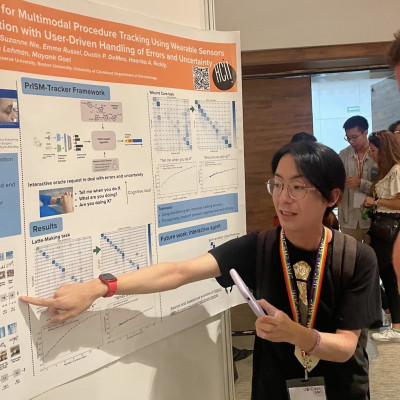
Warning: Undefined variable $current_post_id in /home/www/whowp02.cc.tsukuba.ac.jp/public_html/wp-content/themes/www.imis.tsukuba.ac.jp/archive-oz-custom-alumni.php on line 26
Hiromu Yakura矢倉 大夢
Warning: Undefined variable $current_post_id in /home/www/whowp02.cc.tsukuba.ac.jp/public_html/wp-content/themes/www.imis.tsukuba.ac.jp/archive-oz-custom-alumni.php on line 27
Reflecting on my doctoral program, I feel that, although it was largely influenced by the COVID-19 pandemic, the high degree of freedom I experienced was a highlight of the Intelligent Systems degree program. Particularly, Joint Degree System allowed me to receive guidance in my field of interest, which was instrumental in presenting at top conferences and securing competitive research funding. As a result, I was able to interact with researchers worldwide at various conferences, such as ACM CHI, AAAI, and IEEE ICASSP, and receive feedback on my research through initiatives like the Doctoral Consortium. Utilizing support programs like the Japan Society for the Promotion of Science (JSPS) Research Fellowship was also crucial in smoothly progressing through my doctoral studies. Although my research was primarily conducted remotely and my research base was at the National Institute of Advanced Industrial Science and Technology through the joint graduate school, my time on campus was limited. However, I received valuable feedback during seminar presentations and thesis writing, allowing me to lead a fulfilling student life in this degree program.博士後期課程を振り返ってみると、新型コロナウイルス感染症に翻弄された部分が多かったと感じるものの、それでも自由度高く過ごせたのは知能機能システム学位プログラムのよいところだったかと思います。特に連携大学院制度を用いて、興味分野に合った研究指導をいただくことができたのはとても大きく、トップカンファレンスでの研究発表や競争的研究資金の獲得にも繋がりました。結果としてACM CHIやAAAI、IEEE ICASSP等の様々な領域のカンファレンスにて世界中の研究者と交流を深め、またDoctoral Consortiumなどを通して自らの研究へのフィードバックを得ることができました。また、日本学術振興会特別研究員等の支援制度を利用することができたという点も、博士後期課程をスムーズに進める上で大きな助けとなりました。研究そのものはリモートメインで進めており、また研究拠点が連携大学院の産業技術総合研究所にあったため、在学中にキャンパスで過ごす機会は限られていましたが、セミナー発表や博士論文執筆でのフィードバックでもいろいろなご意見をいただき、この学位プログラムで充実した学生生活を送ることができました。
-

Warning: Undefined variable $current_post_id in /home/www/whowp02.cc.tsukuba.ac.jp/public_html/wp-content/themes/www.imis.tsukuba.ac.jp/archive-oz-custom-alumni.php on line 26
SATOI Daiki里井 大輝
Warning: Undefined variable $current_post_id in /home/www/whowp02.cc.tsukuba.ac.jp/public_html/wp-content/themes/www.imis.tsukuba.ac.jp/archive-oz-custom-alumni.php on line 27
株式会社スクウェア・エニックス(テクノロジー推進部 AIリサーチャー)
Because I was passionate about technological developments which contribute to creating interesting entertainment experiences, I decided to enter the Department of Intelligent Interaction Technologies (IIT; predecessor organization of IMIS). During the program, I invented a technique for automatic CG generation of a variety of swimming fish.
In the research field of entertainment technologies, academic originality is of course necessary, but the usability is also important for creators who make game content and movies. This was the attractive and interesting point for me. On the other hand, my challenge was to lead both researchers and creators to clearly understand why I was recommending this method which I had chosen. I went through some challenging times and learned by trial and error, but with much support from other lab members, my co-researcher (STUDIO4 ℃), and staff from Intel, I dedicated myself to research and made a visible achievement. I was also very lucky to have opportunities to present my research papers on CG at conferences, such as SIGGRAPH, and also to do demonstrations at a public event for Tsukuba city and at universities. I received many comments and feedback from a variety of people, from little kids to a creator from a global film production company. This has become my motivation to continue with my research. Another thing was a research grant which I received from the HAYAO NAKAYAMA Foundation for Science & Technology and Culture. I got to experience using a budget as a research representative and carrying out my research plan.
I am currently doing game development while researching game AI at a company. In the process of forming a research theme based on the ideas for creating more enjoyable games, I feel the skills and experiences which I obtained in the IIT department have been of great use to me.
[Now: SQUARE ENIX CO., LTD. (AI researcher, Advanced Technology Department)]私は面白いエンタテインメント体験や遊びを作ることに貢献する技術を研究したいと考え大学院に進学し、在学中はさまざまな種類の魚が遊泳するCGアニメーションを自動生成する手法を開発しました。
エンタテインメント技術の研究では、学術的な新規性はもちろん、ゲームや映画などのコンテンツを作るクリエイターにとっての有用性が重要となる点が魅力的で面白く感じた点でした。一方で、自分の提案する手法がなぜ良いと思うのかを、研究者とクリエイターの両方に対して分かりやすく説明することが難しい課題でした。試行錯誤の連続で大変苦労しましたが、研究室のメンバーや共同研究先であるSTUDIO4℃、インテルの方々から多くの助力をいただきながら研究に専念できたおかげで研究成果を形にできました。対外発表では、SIGGRAPHなどのCG系学会での論文発表、つくば市や大学の一般向けイベントでのデモ発表の機会に恵まれ、小さな子どもから世界的な映画制作会社のクリエイターまで、さまざまな立場の方から意見や感想をいただけたことが研究を続けるモチベーションに繋がりました。また中山隼雄科学技術文化財団から研究助成をいただき、代表研究者として予算を使用して研究計画を実施する経験もできました。
現在は企業でゲーム開発に携わりながらゲームAIの研究を行っていますが、より面白いゲームを作るためのアイディアを研究テーマとして形にしていく際に、大学院で得られたスキルや経験は大変役立っていると感じています。
-
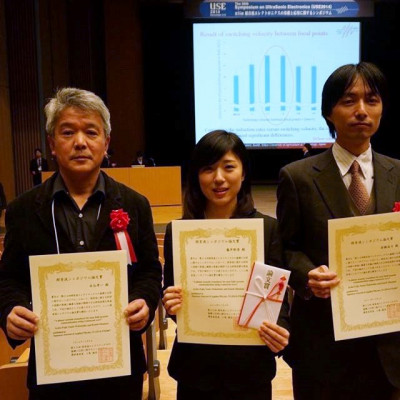
Warning: Undefined variable $current_post_id in /home/www/whowp02.cc.tsukuba.ac.jp/public_html/wp-content/themes/www.imis.tsukuba.ac.jp/archive-oz-custom-alumni.php on line 26
FUJII (MIZUTANI) Ayaka藤井(水谷)郁香
Warning: Undefined variable $current_post_id in /home/www/whowp02.cc.tsukuba.ac.jp/public_html/wp-content/themes/www.imis.tsukuba.ac.jp/archive-oz-custom-alumni.php on line 27
三菱電機株式会社(先端技術総合研究所 メカトロニクス技術部)
In the Department of Intelligent Interaction Technologies (IIT; predecessor organization of IMIS), I chose to study at the Acoustic System Laboratory, where it is possible for students to engage in a variety of themes. I was working on a phenomenon analysis to find out how sound would pass through a vibration plate and be emitted from the surface, and also research on how I could make this useful for communication or as a speaker. When I addressed the research tasks, I kept two important points in mind, “doing whatever I could” and “presenting research results with a positive attitude.” When I was stuck studying at the lab, I tended to think to myself and shut myself off from the outside world. However, when I stopped focusing only on theories and tried to take actions and see things with my own eyes, even if it was just a simple experiment, I started discovering that there were many opportunities to gain new perspectives.
The same applied to my presentation of research results. When I started presenting my ideas at academic conferences and submitting my papers, I received a lot of advice and this inspired me to do further research. Moreover, I received a great amount of support from teaching staff at the lab, and I could finish my doctoral program in just one year. Now at work I’m involved in topics such as vibration analysis with a view to find out how vibration affects the elevator ride quality. The research I was engaged in during the doctoral program doesn’t exactly match what I’m doing now at work, but the attitude towards the research, way of thinking and basic knowledge I learnt there have been extremely useful and are relevant in my work even now. With the feeling of responsibility as well as the excitement I get from seeing the products which I applied my research results to being promoted out in the world, I’m having fun doing research at work every day.
[Now: Mitsubishi Electric Corporation (Mechatronics Technology Department, Advanced Technology R&D Center)]大学院では多様なテーマを扱う音響システム研究室で、振動板の表面に音がにじみ出るような現象の解析や、それを通信やスピーカーとして活用する研究に取り組みました。私が研究を行う上で、特に大切にしていたことは「とにかく手を動かしてみること」と「研究成果を積極的に外へと発信すること」です。研究室にいると、つい部屋に閉じこもって独りで考え込んでしまいがちです。しかし、理論だけではなく、まずは簡単な実験を行ったりして自分の目で確かめることで新しい気づきが得られることが多くなりました。研究成果の発信も同様に、学会発表や論文投稿によって様々なアドバイスをいただくことができ、たくさんの刺激を受けて研究をさらにブラッシュアップすることができました。研究室の先生方にもこのような取り組みを後押ししていただき、最終的には博士後期課程を1年で早期修了することができました。
現在はエレベーターの乗り心地に影響する振動解析などの業務に携わっています。学生時代の研究が業務と完全に一致しているわけではありませんが、博士後期課程までに身につけた、研究を行う姿勢や考え方、基本となる知識は今でも非常に役に立っています。研究成果が製品として世の中に出るという責任感と高揚感に包まれながら、現在も毎日楽しく研究を行っています。
-
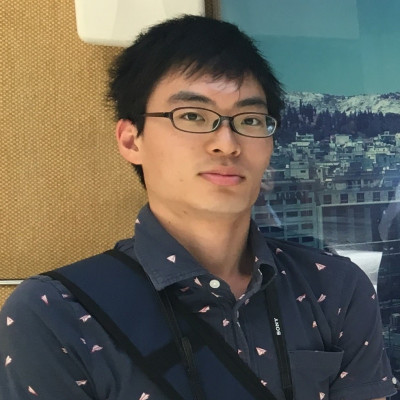
Warning: Undefined variable $current_post_id in /home/www/whowp02.cc.tsukuba.ac.jp/public_html/wp-content/themes/www.imis.tsukuba.ac.jp/archive-oz-custom-alumni.php on line 26
IMAI Yoshihito今井 義人
Warning: Undefined variable $current_post_id in /home/www/whowp02.cc.tsukuba.ac.jp/public_html/wp-content/themes/www.imis.tsukuba.ac.jp/archive-oz-custom-alumni.php on line 27
株式会社デンソーテン(VICT技術本部 車載ソフト技術部)
“I’ve discovered something that no one else has ever before!” that moment where I got to experience the feeling of accomplishment is something which has left the biggest impression on me from my time in the Department of Intelligent Interaction Technologies (IIT; predecessor organization of IMIS). There have been a lot of struggles and time involved to attain this feeling of accomplishment, but for some reason, I always felt motivated to focus on what I was working on every day. The atmosphere of freedom with the lab group which I belonged to, the kind support from teaching staff and the environment where students work hard and encourage each other, all these helped me to spend quality time, I’m sure.
People say “Graduate schools are places where you improve problem-solving skills” and I believe the pleasures of problem solving have a wonderful power which makes us more inquisitive. Now I work at a company and I am involved in software development for an in-vehicle emergency reporting device. This is in a different field to the research which I engaged in at the graduate school so I am facing new challenges every day. Problem-solving skills are always required in my workplace. This is why I decided to enter the doctoral program from April 2018 while continuing to work. I made this big decision because after working at the company for a year, I realized how much more I had to learn and I also reconsidered what I could do better for the future. It’s going to be a big challenge for me to do both work and study at the same time, but more than that, I’m looking forward to opening myself up to new possibilities. For the purpose of gaining a new feeling of accomplishment in my working life, I’ll work hard on improving my skills.
[Now: DENSO TEN Limited (Automotive Software Development Department, VICT Technical Headquarters)]私が大学院に在籍していた際,一番印象に残っていることは,「私以外だれも知らない発見をした!」という,これまで感じたことのない達成感を味わった瞬間です.この達成感に至るまでには,長い時間と葛藤がありましたが,なぜか,日々没頭できるエネルギーが湧いてきたのを覚えています.このような日々を送れたのも,所属していた研究室グループの自由な風土に加え,先生方の親身な支えと,学生同士が切磋琢磨しあう環境があったからだと思います.大学院は「問題解決の訓練をする場所」と言われますが,問題を解決できた喜びは,次なる喜びへと突き進みたくなる,不思議な力を持っていると思います.
現在は,企業において,自動車に搭載する緊急通報装置のソフトウェア開発に携わっています.大学院で携わった研究とは畑違いの分野で,日々四苦八苦していますが,仕事においても,問題を解決する 力は常に問われています.そして,2018年4月より,社会人博士学生として,入学することにしました.これは,社会人生活の1年間を通して,自分の未熟さや,自分にできることを再検討した上での決心です.仕事と勉学との両立は非常に不安ではありますが,それ以上に,これからどのような可能性が開けるのか,楽しみで もあります.社会人生活はこれから長いですが,新たな達成感を味わい続けられ るよう,スキルアップに励んで参りたいと思います.
-
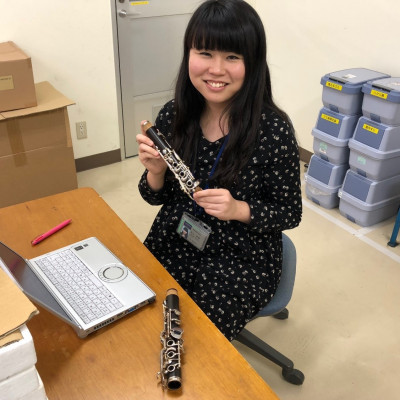
Warning: Undefined variable $current_post_id in /home/www/whowp02.cc.tsukuba.ac.jp/public_html/wp-content/themes/www.imis.tsukuba.ac.jp/archive-oz-custom-alumni.php on line 26
AKIYAMA Manami秋山 愛美
Warning: Undefined variable $current_post_id in /home/www/whowp02.cc.tsukuba.ac.jp/public_html/wp-content/themes/www.imis.tsukuba.ac.jp/archive-oz-custom-alumni.php on line 27
ヤマハ株式会社(楽器開発統括部 B&O開発部 管教育楽器開発グループ)
When I was in my third year as a university student, I majored in Applied Physics and I was studying about ultrasound. At that time when I thought about entering graduate school and what I wanted to do afterwards, I realized that I had a strong interest in acoustics and considered dedicating my whole life to this field. Then, I found the Acoustic System Laboratory, where I could research about acoustics while applying scientific approaches. I felt certain that I could spend a fulfilling time while improving myself there. Because I moved from the physical science field to the engineering field, I was at a loss at first, but it didn’t take me long to get used to the new field because I received generous support from teaching staff and senior students. In the Department of Intelligent Interaction Technologies and the Acoustic System Laboratory, there were many colleagues who were talented and unique not just in the research field but also in the world of hobbies. So I engaged in studying while being inspired by my colleagues. I sometimes joined in management of workshops and conferences, and I went through a lot of experiences.
After completion of the program, I joined Yamaha Corporation where I became involved in musical instrument acoustics and I started my career as a wind instrument developer. Every day is a new challenge for me facing the difficultness of musical instrument development and I feel that there are still lots of things for me to learn. However, it’s really rewarding and fun and my life is very fulfilling. I’m not only able to apply the engineering and acoustic knowledge which I learned from the program in the IIT department, but also analysis methods, verifying a hypothesis process and logical ways of thinking etc., everything I learned there is applicable. Those two years in Tsukuba, when I spent time discussing many things with lecturers and colleagues until the topic was fully explored, was a wonderful time in my life. I could open myself up to many new possibilities. This really was a priceless experience.
[Now: Yamaha Corporation (Wind Instrument for Education Group, B&O Development Division, Department of Musical Instrument Development)]大学3年の時、私は応用物理学を専攻し超音波の研究をしていました。進学を考える時期になり、その後の自分の生き方を考えたときに、生音の響きに対する強い興味に気付き、生涯かけて突き詰めたいと思いました。そこで、科学的なアプローチで音響の研究ができる場所を探した結果、出会ったのが音響システム研究室でした。ここなら成長しながら充実した時間を過ごすことができると確信しました。理学系から工学系に来たためはじめは戸惑いましたが、先生方・先輩方の手厚いサポートもありすぐに慣れることが出来ました。専攻や研究室には、研究にも趣味にも優秀でユニークな仲間がたくさんいて、毎日刺激を受けながら研究に励みました。時には研究会や学会運営にも参加し、様々な経験をさせていただきました。
修了後は、楽器の音響に関わることのできるヤマハ株式会社に入社し、管楽器開発者として歩み始めました。楽器開発の難しさと自分の未熟さを実感する日々ですが、大きなやりがいを感じながら楽しく充実した生活を送っています。大学院で学んだ工学や音響の知識はもちろんながら、解析・分析の仕方、仮説・検証のプロセス、論理的な考え方等、学んだことが生きていると感じています。筑波での2年間には、先生や仲間と気の済むまで議論を続けた素晴らしい生活がありました。自分の様々な可能性を知ることができました。自分にとって間違いなくかけがえのない時間でした。
-

Warning: Undefined variable $current_post_id in /home/www/whowp02.cc.tsukuba.ac.jp/public_html/wp-content/themes/www.imis.tsukuba.ac.jp/archive-oz-custom-alumni.php on line 26
KUDO Yusuke工藤 祐介
Warning: Undefined variable $current_post_id in /home/www/whowp02.cc.tsukuba.ac.jp/public_html/wp-content/themes/www.imis.tsukuba.ac.jp/archive-oz-custom-alumni.php on line 27
NTTデータ (技術革新統括本部)
I entered the Graduate School of the University of Tsukuba from the National Institute of Technology, Nagano College. Because I wasn’t a student from the university, I felt a bit nervous before entering but I actually had a amazing time there.
Because I was involved in robotics when I was a student at Nagano College, I always wanted to do more research on robots. This was the reason I decided to enter the Department of Intelligent Interaction Technologies (IIT; predecessor organization of IMIS). In the lab, we were working on research where we personified robots or characters and made them interact socially with humans. To put it simply, we were researching about robots which would act like humans. For more details, please search for HAI Laboratory. It’s highly recommended (hahaha).
During the program, I also had a great opportunity to attend the HAI International Conference on Human-Agent Interaction in Singapore, and I greatly enriched my knowledge.
Now I work for NTT DATA Corporation. Since I work in the IT industry, I’m often asked to summarize data based on facts and give logical explanations to others. In addition to this, the ability to investigate technical information from overseas and catch up to it is often required. Even though the field at my work is a bit different to the robotics which I was engaged with in the lab, those experiences which I gained there, such as making presentations at conferences and writing and reading research papers have been very useful. I feel very happy and proud that I could gain a variety of knowledge and spend a fulfilling two years in the IIT department.
[Now: NTT DATA (Technological Innovation Management Division)]私は,外部(長野工業高等専門学校)から筑波大学の大学院へ進学をしました.外部からの進学ということもあり,不安もありましたが,毎日楽しく大学院生活を送ることができました.
長野高専時代にロボコンをやっていたこともあり,ロボットに関わる研究をしたいと思ったことが進学を決めた理由です.研究室はロボットやキャラクター等を擬人化して捉え,人と社会的なやり取りを行うように働きかけるという研究を行っているところで,簡単に言うと人っぽい振る舞いをするロボットの研究をしていました.詳しくはHAI研究室で調べてみてください.おすすめです(笑)
また,在学中に海外(シンガポール)での国際会議HAIでの発表も経験し,知見を広げることができました.
現在は,NTTデータで働いています.研究室時代にやっていたロボット系とは少し分野が違いますが,IT業界の仕事ということで得られた事実をもとにまとめ,人に論理的に説明する力や海外の技術情報を調査・キャッチアップする力が必要なことが多く,大学院時代に学会発表を行ったり論文を読んだり書いたりした経験が役に立っていると感じています.
様々な知識を得られ,充実した2年間を過ごせたため,大学院に進学してよかったと思っています.
-
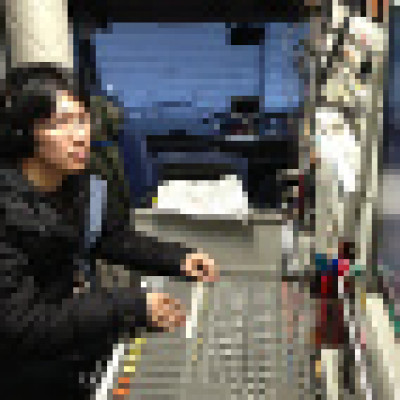
Warning: Undefined variable $current_post_id in /home/www/whowp02.cc.tsukuba.ac.jp/public_html/wp-content/themes/www.imis.tsukuba.ac.jp/archive-oz-custom-alumni.php on line 26
OGURA Kei小倉 渓
Warning: Undefined variable $current_post_id in /home/www/whowp02.cc.tsukuba.ac.jp/public_html/wp-content/themes/www.imis.tsukuba.ac.jp/archive-oz-custom-alumni.php on line 27
日本放送協会
When I was a third-year university student, I thought about my path for the future after graduation. I wanted to do something related to both physics, which was my major at the university, and the cello, which I was learning to play professionally for more than 20 years, and I also wanted to expand my horizons. Acoustic System Laboratory was the one I found after considering all sorts of careers. I felt certain that this was a place where I would be able to physically analyze how the stringed instrument, which is something very familiar to me, produces sound. Lecturers and lab members also had a deep interest in art, and it was very attractive for me that I could do music at the same time.
When I actually got involved in research there, I found that analyzing the physical phenomena of musical instruments was actually quite complex and challenging, but I learned so much precious knowledge and developed a new sense, which I wouldn’t be able to get from doing music only. Also, the experience of attending the international conference which was held in Australia was especially impressive, and this was a moment when everything I had been engaged in up until then, such as research, music and language study, came to be linked together.
After graduation, I joined the Japan Broadcasting Corporation (NHK), where I thought I would make use of the experiences which I had gained in the Department of Intelligent Interaction Technologies (IIT; predecessor organization of IMIS), and I started working as a broadcast engineer. In the future I have a passion to take part in some research on acoustics in broadcasting, but at the moment, to extend my knowledge, I’m working hard on many tasks such as relay broadcasting and urgent news programs etc. I’ve been busy but I’m living every day to the fullest.
[Now: Japan Broadcasting Corporation]大学3年の時、当時専攻していた物理学と、20年以上専門的に学んでいるチェロを結び付けさらに自分の視野を広めたいという思いから、卒業後の進路を迷っていました。そして様々な進路を検討する中で出会ったのが、音響システム研究室でした。この研究室であれば、自分がこれまで当たり前のように弾いていた弦楽器がどのように撥音されているか物理的に解析できると考えたためです。また、先生方や研究室のメンバーも芸術への関心が高く、音楽も両立して行えるという事も魅力の一つでした。
実際に研究を進めていくと、楽器の物理現象の解析は非常に複雑で難しく、様々な面で苦労がありましたが、これまでの音楽だけでは得ることが出来ない貴重な知識や感覚を身につけることが出来たと思います。特に国際学会でオーストラリアに行った時のことは今でも印象に強く、研究・音楽・語学と興味を持って学んできたものが全てつながる瞬間でした。
卒業後はこれまでの経験を活かせると感じたNHKに入局し、放送技術者として業務に携わっています。将来は放送における音響研究に携わりたいと思っていますが、現在は広い知識を付けるため、中継や緊急報道など様々な業務に追われる忙しくも密度の濃い毎日です。
-
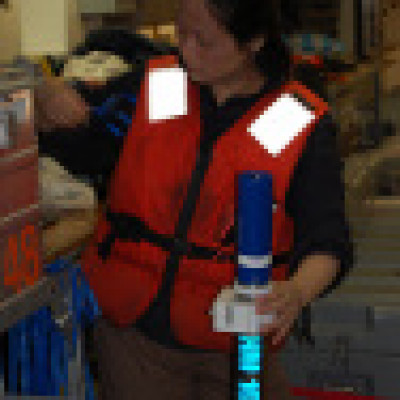
Warning: Undefined variable $current_post_id in /home/www/whowp02.cc.tsukuba.ac.jp/public_html/wp-content/themes/www.imis.tsukuba.ac.jp/archive-oz-custom-alumni.php on line 26
OGASAWARA Hanako小笠原 英子
Warning: Undefined variable $current_post_id in /home/www/whowp02.cc.tsukuba.ac.jp/public_html/wp-content/themes/www.imis.tsukuba.ac.jp/archive-oz-custom-alumni.php on line 27
防衛大学校教官
After I finished the Master’s Program in the Department of Intelligent Interaction Technologies (IIT; predecessor organization of IMIS), I took a position at a company and started working at the same time as many other science and engineering students did. The reason for this was that even though I wanted to keep studying at the graduate school, I was also interested in the world outside the university. Working at a company allowed me to see a different world and my days were fulfilling. However, I somehow ended up working as an assistant at my current workplace, the National Defense Academy of Japan, and started spending days being engaged in academic research again. To survive in the world of academic research, gaining a PhD is the minimum requirement. Because the Graduate School of the University of Tsukuba offers entry to working adults, there was a chance for me to get a PhD while continuing to work. This was why I decided to enter the doctoral program.
I was actually doing my research work both at work and at home, but being able to give presentations at seminars and see other people’s research was the best part of being a student. The university is a place where you can interact with the latest research in a variety of academic fields. I saw this in a new light since I wasn’t a direct entry student. Now I’ve been engaged in the field of underwater acoustics and researching on measurements of the marine environment using acoustic wave propagation. Except for having the same keyword “acoustics,” this theme is actually quite different to the research which I engaged in during my master’s program, but because I already built up basic strength to engage in research, I could just keep going.
In the present days when a variety of career plans are possible, improving your skills at the graduate university which offers entry to working adults should be one of the greatest options.
[Now: Associate Professor, National Defense Academy]私は筑波大学大学院の修士課程を修了したのち,理工系の多くの学生と同様に企業へ就職しました.大学へ残りたいと思う一方,大学だけの世界でいいのだろうかという不安もあったからです.就職は社会人としての世界を見ることができ,充実したものでした.ところが,思わぬ経緯で現在の職場,防衛大学校に助手として採用されることとなり,再び学術研究の日々をスタートさせることとなりました.アカデミックな世界で生き残っていくためには博士号取得は最低条件となります.筑波大学大学院では社会人に対しても門戸を広げており,仕事を続けながら学位取得できるチャンスがありましたので,進学することとなりました.研究自体は自宅と職場で進めていましたが,セミナー発表での議論や他の研究を垣間見ることができたのは学生として大きな収穫でした.幅広い学際分野の最新研究に触れられる大学の価値を再認識でき,そのまま進学していた場合とは違った新鮮さがあったのだと思います.現在は水中音響分野において,音波伝搬による海洋環境計測の研究に従事しています.このテーマは「音響」というキーワードを除けば修士までの研究とは大きく異なるものでした.それでも進めることができたのは,修士課程までで研究に対する基礎体力がついていたからだと思います.
多様なキャリアプランが可能な現在,社会人にも門戸を広げている大学でさらなるスキルアップを図るのも選択肢の一つではないでしょうか.
-
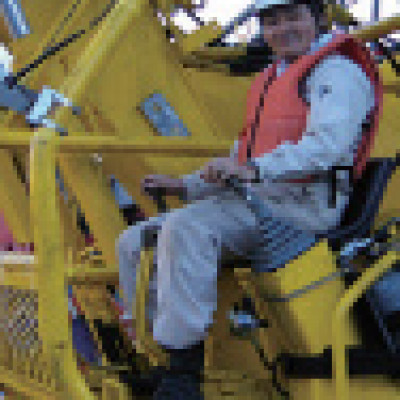
Warning: Undefined variable $current_post_id in /home/www/whowp02.cc.tsukuba.ac.jp/public_html/wp-content/themes/www.imis.tsukuba.ac.jp/archive-oz-custom-alumni.php on line 26
HIRABAYASHI Taketsugu平林 丈嗣
Warning: Undefined variable $current_post_id in /home/www/whowp02.cc.tsukuba.ac.jp/public_html/wp-content/themes/www.imis.tsukuba.ac.jp/archive-oz-custom-alumni.php on line 27
独立行政法人港湾空港技術研究所
Around the time when I decided to enter the graduate school, I was engaged in research on the remote operation of marine construction equipment at work, and I believed that this breakthrough was the machine interface. Although gaining sufficient understanding of the working conditions was very important for the remote operation, there was no research on how we could grasp the situation not only in the marine civil engineering field but also in the construction machinery field. To conduct research on the method of providing information to the operator, I decided to enter and study in the Department of Intelligent Interaction Technologies (IIT; predecessor organization of IMIS), which was a totally different field to marine construction.
If you are working full-time and thinking about entering this graduate school, I’m sure you already know enough about the benefits of studying here. But, at the same time, you may be concerned about how to balance work and study, tuition payments and the impact on your workplace etc. I also had the same concerns. However, because I obtained understanding from both my family and management at work, as well as receiving kind support from our enthusiastic supervisor, I could finish my degree in the IIT department. The wide variety of knowledge which I gained in the IIT department has been very useful for research in my current work.
Of course, balancing work and study wasn’t that easy for me, but the experiences and abilities I gained through the doctoral program were something beneficial not only to myself or companies I work at, but also to our whole society from a broader perspective.
For everyone who is working full-time and thinking of studying at the graduate school, I know that doing something new takes courage, but please remember that in your long working life, you may lose something if you skimp on that extra effort which only takes a few years. Please challenge yourself with a clear goal and breakthrough thinking.
[Now: Port and Airport Research Institute]大学院への入学当時,私は水中建設機械の遠隔操作についての研究を担当しており,そのブレイクスルーはマンマシンインタフェイスにあると考えていました.遠隔操作施工は作業状況の認識が重要でありますが,海洋土木はもちろん,建設機械の分野でも状況認識に関する研究は皆無であり,オペレータへの情報提示手法を研究するため海洋土木とはまったくの異分野と言えるシステム情報工学研究科への入学を決意しました.
既に就職し,社会人として活躍されている方が大学院への入学を考えてこのページを読んでいるのであれば,その方は大学院で得られるメリットを十分把握していると思います.しかしそれ以上に,仕事と勉学の両立,金銭的負担,勤務先への影響など不安を感じているのではないでしょうか.
私も多くの不安を感じながら入学しましたが,幸いにして家族や上司の理解を得られ,親身かつ熱心な教官にも恵まれたおかげで無事修了し,勤務先での研究にも大学院で得られた様々な知見を役立てることができています.
もちろん大学院と職務との両立において迷惑をかけたこともありましたが,得られた経験や能力は自分や会社だけでなく,広い目で見れば社会に貢献できるものであるはずです.
社会人入学をお考えの皆さん,新たに行動を起こす際には勇気が必要ですが,長い社会人生活を過ごすなかでわずか数年の努力を惜しむのは逆に損であると考え,明確な目的とブレイクスルー思考を持って臨んでみてください.
-
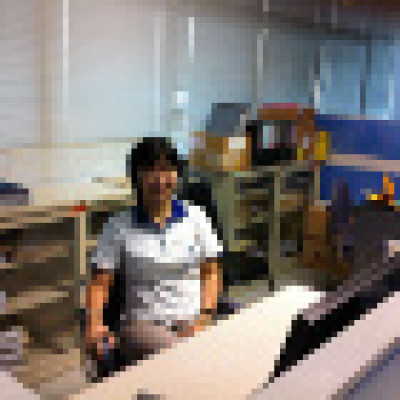
Warning: Undefined variable $current_post_id in /home/www/whowp02.cc.tsukuba.ac.jp/public_html/wp-content/themes/www.imis.tsukuba.ac.jp/archive-oz-custom-alumni.php on line 26
Kanticha KittipeerachonKanticha Kittipeerachon
Warning: Undefined variable $current_post_id in /home/www/whowp02.cc.tsukuba.ac.jp/public_html/wp-content/themes/www.imis.tsukuba.ac.jp/archive-oz-custom-alumni.php on line 27
タイニチ工科大学教員
“Would you like to visit our lab to discuss further?” was the sentence that made my first visit to Tsukuba. At that time, I had a chance to attend an undergraduate class, and have lunch and talk with lab members and my supervisor. A warm welcome and friendly atmosphere made me feel less nervous talking with them.
I was a foreign student from Thailand and entered the doctoral program of the department of Intelligent Interaction Technologies as a privately-financed student. Being a foreign student, I of course had difficulty with the language at first. Fortunately, the tutor system run by the university helped me in the first year in such matters as academic and daily lives in and around the university. Besides the tutor system, the university arranged numerous assistance programs, such as financial supports including one from the Japanese government.
My Ph.D. work was a theoretical one, dealing with some approximate and the exact discretization techniques for the nonlinear differential equation called Riccati equation. In our lab, there were students taking on experiments, theoretical work, and both. We shared knowledge of other students? research work and had seminars reading papers and books of our interests.
From my first day I got a great help and kind support from my supervisor, all the lab members, and the university staff. Although I faced difficulties at times during the three years I spent in Tsukuba, I learned many things, both academic and non-academic. Now I work as lecturer in my home country, and I intend to apply what I have learned in Tsukuba to teach my students and build my research career.“Would you like to visit our lab to discuss further?” was the sentence that made my first visit to Tsukuba. At that time, I had a chance to attend an undergraduate class, and have lunch and talk with lab members and my supervisor. A warm welcome and friendly atmosphere made me feel less nervous talking with them.
I was a foreign student from Thailand and entered the doctoral program of the department of Intelligent Interaction Technologies as a privately-financed student. Being a foreign student, I of course had difficulty with the language at first. Fortunately, the tutor system run by the university helped me in the first year in such matters as academic and daily lives in and around the university. Besides the tutor system, the university arranged numerous assistance programs, such as financial supports including one from the Japanese government.
My Ph.D. work was a theoretical one, dealing with some approximate and the exact discretization techniques for the nonlinear differential equation called Riccati equation. In our lab, there were students taking on experiments, theoretical work, and both. We shared knowledge of other students? research work and had seminars reading papers and books of our interests.
From my first day I got a great help and kind support from my supervisor, all the lab members, and the university staff. Although I faced difficulties at times during the three years I spent in Tsukuba, I learned many things, both academic and non-academic. Now I work as lecturer in my home country, and I intend to apply what I have learned in Tsukuba to teach my students and build my research career.
-

Warning: Undefined variable $current_post_id in /home/www/whowp02.cc.tsukuba.ac.jp/public_html/wp-content/themes/www.imis.tsukuba.ac.jp/archive-oz-custom-alumni.php on line 26
MANO Yuichiro間野 裕一郎
Warning: Undefined variable $current_post_id in /home/www/whowp02.cc.tsukuba.ac.jp/public_html/wp-content/themes/www.imis.tsukuba.ac.jp/archive-oz-custom-alumni.php on line 27
東海旅客鉄道株式会社(JR東海)
I’ve heard, “Graduate schools are a place where you do not address a problem which already has the answer, but instead where you address a problem which does not yet have the answer.” Research is exactly something where we address a problem which does not yet have an answer or identify what the actual problem is.
In the Department of Intelligent Interaction Technologies (IIT; predecessor organization of IMIS), I was researching about a 3D display which reduces eye strain. Even though the research contents do not directly relate to my current work, I still retain the engineering way of thinking, which I learnt from research activities, and utilize these in my work.
During the program, I also had many opportunities to make research presentations, which were always about “a problem which does not yet have an answer.” When I prepared my presentations that are required to be made within a fixed timeframe and number of letters, I received very detailed instructions about how I could make it easier to understand, tips for effective presenting and how to write effective sentences from teaching staff. These have also been quite useful in my current position at work.
When you address “a problem which does not yet have the answer,” you will need a different approach to the one you have been applying up until now. That is why, when you make your best effort on a single theme for two years, it becomes one of the core abilities for your future self.
[Now: Central Japan Railway Company (JR Tokai)]大学院というところは「すでに答えがある問題」を学ぶ場所ではなく、「まだ答えがない問題」に取り組む場所なのだ、という言葉を聞いたことがあります。研究活動は、まさに、まだ答えが無い問題に取り組んだり、問題そのものを明らかにする活動であったりします。
私は大学院で、眼が疲れにくい立体ディスプレイについて研究していました。今の仕事と研究の内容はまったく関係していませんが、研究を進める上で培った工学者としての考え方は、今の仕事にも生きています。
また、在学中は自分の研究について発表する機会が多く存在しましたが、限られた時間・文字数で「まだ答えのない問題」について説明するとき、
どうすればわかりやすくなるのかという発表の工夫・文章の書き方を非常に丁寧に指導していただきました。こちらもまた、今の仕事を進めていく上で非常に役立っています。
「まだ答えがない問題」に取り組むにあたっては、これまでの勉学のようにうまくいかないこともあるかと思われます。しかし、だからこそ1つのテーマについて、2年という時間をかけて真摯に取り組むことで、その後の自分の核となる力を身につけることができます。
-

Warning: Undefined variable $current_post_id in /home/www/whowp02.cc.tsukuba.ac.jp/public_html/wp-content/themes/www.imis.tsukuba.ac.jp/archive-oz-custom-alumni.php on line 26
YAMAGOE Kyoko山越 恭子
Warning: Undefined variable $current_post_id in /home/www/whowp02.cc.tsukuba.ac.jp/public_html/wp-content/themes/www.imis.tsukuba.ac.jp/archive-oz-custom-alumni.php on line 27
東日本電信電話株式会社
In the Department of Intelligent Interaction Technologies (IIT; predecessor organization of IMIS), I was involved in research on groupware. This was because I was originally interested in the impact on human communications when computers get involved and I wanted to evaluate this. Engineering skills were utilized for the system design and development to verify my idea. On the other hand, since the target for the evaluation was human, I spent a lot of time thinking and discussing how people used it, responded to it and felt about it etc. This was the point where the research was very attractive for me.
There are a lot of things which I gained through my research project, for example, technical knowledge, skills and schemes etc. I also achieved a goal of presenting my paper at an academic conference as well as submitting it to a journal. But, more than this, I believe that my fulfilling student life, in which I could spend a sufficient amount of time to think of my own research theme, get advice from advisors and talk and discuss with lab members who had an interest in the same field, is something that has become a real life asset. There were all sorts of interesting, fun and thought-provoking things that I found at that time.
Now I have a job and I’m working in a field which is different to the one I researched at the graduate school. However, I feel that all those things I went through there have been serving as a guide whenever I start new things at work.
[Now: Nippon Telegraph and Telephone (NTT) East Corporation]私は大学院ではグループウェアの研究に携わりました。もともとコンピュータが人のコミュニケーションに関与することの影響について興味があり、その評価をしてみたいと考えたからです。この研究が私にとって魅力的だったのは、自分の考えを検証するためのシステムの設計・構築においては工学を活用する一方で、評価対象が人であるため、人がどう使ったか、反応したか、感じたか、などについて時間をかけて考え、検討することができるからでした。
技術的な知識・スキルやその習得スキーム等、研究を通して得たものは数多くあります。また研究テーマのゴールとして、学会や論文誌での発表という成果を出すこともできました。でも実は個人的には、学生ならではの贅沢な時間配分で、自分が選んだ研究対象について考えたり、先生にご指導頂いたり、同じ分野に興味を持つ研究室の仲間と議論したり一緒に考えたりしたことこそが、一番の財産になっているのではないかと思います。当時面白いと思ったもの、良いと感じたり、考えたりしたもの、またその考え方。今は就職し、研究とは違う仕事をしていますが、それらが新しいものごとに取り組む際の最初の指針となり、役立ってると感じています。
-

Warning: Undefined variable $current_post_id in /home/www/whowp02.cc.tsukuba.ac.jp/public_html/wp-content/themes/www.imis.tsukuba.ac.jp/archive-oz-custom-alumni.php on line 26
MASUKO Soh益子 宗
Warning: Undefined variable $current_post_id in /home/www/whowp02.cc.tsukuba.ac.jp/public_html/wp-content/themes/www.imis.tsukuba.ac.jp/archive-oz-custom-alumni.php on line 27
楽天株式会社 楽天技術研究所
I had a chance to participate in the MITOU Software Creation Program hosted by IPA when I was a fourth-year university student.
From my primary school years to university, I just focused on the learning style of using existing textbooks and putting all my effort into to making the “1” into “100.” So I think this was the first time for me to get involved in research work which creates something from scratch. At that time, I didn’t know what to start with and I ended up facing many challenges. But pioneering a new field with my own ideas through a form of research was not only difficult but also very interesting.
In the Department of Intelligent Interaction Technologies (IIT; predecessor organization of IMIS), I was particularly engaged in research on generating CG character animation. Because I was very lucky to have great lab members, as well as being adopted as a researcher for a fellowship program conducted by the Japan Society for the Promotion of Science, I could devote myself to research in such a privileged environment. Since I joined the lab shortly after it was established, we needed to start many things from “zero” and I spent a lot of energy to take the first step forward at the beginning. However, because of this, I gained many experiences where I actively pursued expertise, unlike the passive learning I was doing up until then.
Currently I’m working on research in a field which is different to the one I engaged with at the graduate school, however, the framework I learnt from the research process with which we created “1” from “0” has been very useful. I hope that you can feel the pleasure of creating “1” from “0” while you are a student.
[Now: Rakuten, Inc. (Rakuten Institute of Technology)]学部4年時にIPAの主催する「未踏ソフトウェア創造事業」に参加する機会がありました。それまで小学校から大学まで既存の教科書を使い「1」をどう「100」にするかを詰め込む勉強に注力していた私にとって、従来にない新しいアイディアを考え、何かを創り出すという研究活動はこの時が初めてだったかと思います。当初は何から手をつければ良いのか分からず大変苦労しましたが、研究という自らの発想で新しいフィールドを開拓していく作業の難しさを感じつつも興味を覚えていきました。
大学院では特にCGキャラクタのアニメーション生成の研究に従事し、日本学術振興協会の特別研究員という奨学制度や研究室のメンバーにも恵まれ、充実した環境で研究活動に没頭することができました。まだ若い研究室であったこともあり、大学院に進学した当初はまさに「0」からのスタートの連続で、初めの一歩を踏み出すことに非常に多くのエネルギーを費やしました。しかし、これまで行ってきた受動的な勉強ではなく、能動的に専門性を追求する経験が多くできたと考えています。
現在は大学院で専攻した専門とは異なる分野の研究を行っていますが、研究という「0」から「1」を生み出す過程で培ったフレームワークは大変活かされています。皆さんにも是非「0」から「1」を創りだす楽しさを学生時代に多く感じていただけたらなと思います。
-
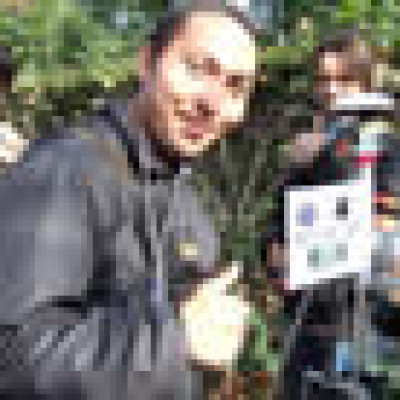
Warning: Undefined variable $current_post_id in /home/www/whowp02.cc.tsukuba.ac.jp/public_html/wp-content/themes/www.imis.tsukuba.ac.jp/archive-oz-custom-alumni.php on line 26
Morales Saiki Luis YoichiMorales Saiki Luis Yoichi
Warning: Undefined variable $current_post_id in /home/www/whowp02.cc.tsukuba.ac.jp/public_html/wp-content/themes/www.imis.tsukuba.ac.jp/archive-oz-custom-alumni.php on line 27
名古屋大学 未来社会創造機構 特任准教授
I entered the graduate school of the University of Tsukuba in 2004. I did two years of M.A. and since April of 2006 I am coursing the Ph.D. course. During the five years I passed in the graduate course I learned many things which are not necessarily related to the academic point of view. Organization, punctuality, disposition, tolerance and unconditional support are some of the attributes that excel from the Intelligent Interaction Technologies (IIT) Department. With such characteristics, I consider that the IIT department offers a good environment to study, discuss and propose ideas and off course do research.
In my personal experience, I had the opportunity of creating and participating in study groups where we selected a topic of interest, we studied it, made presentations about it, had numerous discussions and finally made some implementations. In the end I think that interaction and discussion not only with our advisor but also with our colleagues is an important source for creating new ideas and receiving feedback. I consider the “group discussions” as some of the most valuable experiences I passed through my graduate student life. They were useful to improve research skills and get used to work in group. I think that teamwork is fundamental when people work in a common project as will most probably be the case in the near future either in a company, research institute or university.
Being in this graduate school was an important turning point for my life. In both academic and non-academic backgrounds I am willing to apply the knowledge (know how) I learned and try to keep improving as a human being and an engineer.I entered the graduate school of the University of Tsukuba in 2004. I did two years of M.A. and since April of 2006 I am coursing the Ph.D. course. During the five years I passed in the graduate course I learned many things which are not necessarily related to the academic point of view. Organization, punctuality, disposition, tolerance and unconditional support are some of the attributes that excel from the Intelligent Interaction Technologies (IIT) Department. With such characteristics, I consider that the IIT department offers a good environment to study, discuss and propose ideas and off course do research.
In my personal experience, I had the opportunity of creating and participating in study groups where we selected a topic of interest, we studied it, made presentations about it, had numerous discussions and finally made some implementations. In the end I think that interaction and discussion not only with our advisor but also with our colleagues is an important source for creating new ideas and receiving feedback. I consider the “group discussions” as some of the most valuable experiences I passed through my graduate student life. They were useful to improve research skills and get used to work in group. I think that teamwork is fundamental when people work in a common project as will most probably be the case in the near future either in a company, research institute or university.
Being in this graduate school was an important turning point for my life. In both academic and non-academic backgrounds I am willing to apply the knowledge (know how) I learned and try to keep improving as a human being and an engineer.
-

Warning: Undefined variable $current_post_id in /home/www/whowp02.cc.tsukuba.ac.jp/public_html/wp-content/themes/www.imis.tsukuba.ac.jp/archive-oz-custom-alumni.php on line 26
KOIZUMI Naoki小泉 直生
Warning: Undefined variable $current_post_id in /home/www/whowp02.cc.tsukuba.ac.jp/public_html/wp-content/themes/www.imis.tsukuba.ac.jp/archive-oz-custom-alumni.php on line 27
新日鉄ソリューションズ株式会社 産業ソリューション事業部
I engaged in research on distortion-free data compression in the Department of Intelligent Interaction Technologies (IIT; predecessor organization of IMIS), and now I’m working as an infrastructure system engineer.
You may wonder if my research in the IIT department has something to do with my current work. When I chose the research theme at that time, I actually didn’t think of my future career and also the knowledge of data compression hasn’t been applied at my current field of work. Nonetheless, I can assure you that experiences I gained through the program are quite precious for myself today.
Achievements regarding the research theme aren’t only important, but also engineering skills which I cultivated through research activities are important. I strongly believe that engineering knowledge and thinking power is so important in everyday work.
You may be feeling a bit anxious or unsure about enrolling in graduate school, but don’t be concerned, just face the task in front of you. No matter what field of work you work in, as long as you are an engineer, what you will gain from doing so will become quite useful for sure.
[Now: NS Solutions Corporation (Industrial Solution Division)]私は大学院で無歪みデータ圧縮について研究し、現在は基盤系システムエンジニアとして働いています。
大学院での研究活動が、仕事の役に立っていないのではないか、と思われる方もいるかもしれません。正直なところ、当時、将来の職業を見据えて研究テーマを選んだわけではありませんし、実際に今の仕事でデータ圧縮の知識が生かされるわけでもありません。
しかし私は、大学院時代の経験が現在の自分にとって大変貴重なものだと感じています。
研究テーマに対する成果だけが、大学院での成果なのではなく研究活動を通じて磨くことができた工学者としての能力が、重要な成果であったと思います。日々働く中で、工学的知恵・思考力の大切さを痛感するからです。
大学院への進学にあたり、不安や迷いを感じることもあると思いますが、恐れずに目の前のテーマと向き合ってみてください。そこで得られたものは、技術者である限り、研究テーマや仕事の分野にかかわらず必ず役に立つはずです。
-

Warning: Undefined variable $current_post_id in /home/www/whowp02.cc.tsukuba.ac.jp/public_html/wp-content/themes/www.imis.tsukuba.ac.jp/archive-oz-custom-alumni.php on line 26
TAKEMURA Masayuki竹村 雅幸
Warning: Undefined variable $current_post_id in /home/www/whowp02.cc.tsukuba.ac.jp/public_html/wp-content/themes/www.imis.tsukuba.ac.jp/archive-oz-custom-alumni.php on line 27
株式会社日立製作所日立研究所 情報制御第二研究部ITSユニット
I had a strong desire of wanting to continue to research about image processing and improve my expertise. I also thought that going to a graduate school and receiving a higher degree would help me find the job I wanted, so I decided to enter the Department of Intelligent Interaction Technologies (IIT; predecessor organization of IMIS). When I finished my master’s program, I was unsure about my future career path. But when I thought it over, I found myself to be passionate about pursing further expertise and a career in research. This was how I decided to enter the doctoral program.
The part of my life I spent in the lab was quite busy but I learnt so many things which I wouldn’t have been able to learn from lectures and exercises. Not only academic knowledge for doing research, but also the significance and policies of research, how we should think about its direction, how we investigate previous studies, how to promote its good points, and our stance of always pursing ways to solve problems and so on, were all important things which I could learn.
Of course, I still have many things to learn, but those things I learnt through my doctoral program have been very useful after starting work. In my field of work I’m currently engaged in research on dashcam image processing, which enables me to apply the knowledge I gained in the IIT department.
[Now: Hitachi Research Laboratory, Hitachi, Ltd. (Information Control ITS Unit Research Division II)]大学院へ進学したのは、画像処理の研究を続け専門性を深めたいという思いがありました。大学院への進学は就職にも有利と考え大学院への進学を決めましたが、修士から博士への進学は研究職以外への就職は難しくなると考え悩みました。しかし、更なる専門性を追求し研究職につきたいという思いから、博士課程への進学を決めました。
研究室での生活は大変忙しくもありましたが、講義や演習では学べない多くのものを学びました。研究のための学問的な知識は当然のことながら、研究の意義や方針、方向性をどのように考えるか、関連研究の調査、関連研究の上を行くような軌道修正、そして研究の長所をアピールする方法、課題を解決する方法を常に探しつづける姿勢、など、研究を続ける上で非常に大切なものを学ぶことができたと考えています。
もちろん、現在もなお勉強中の身でありますが、大学院で学んだことが就職後も大変活かされています。現在は、大学院での知識をそのまま活かし、車載カメラの画像処理を研究しています。
-
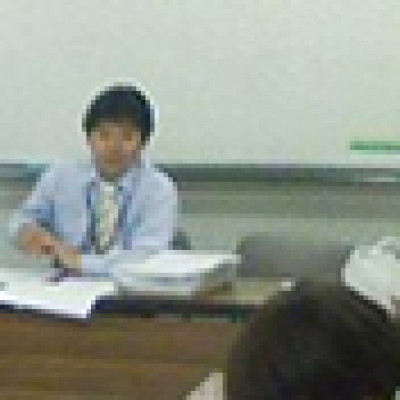
Warning: Undefined variable $current_post_id in /home/www/whowp02.cc.tsukuba.ac.jp/public_html/wp-content/themes/www.imis.tsukuba.ac.jp/archive-oz-custom-alumni.php on line 26
MOROKAMI Shigemitsu諸上 茂光
Warning: Undefined variable $current_post_id in /home/www/whowp02.cc.tsukuba.ac.jp/public_html/wp-content/themes/www.imis.tsukuba.ac.jp/archive-oz-custom-alumni.php on line 27
法政大学 社会学部 メディア社会学科 准教授
I studied about the mechanism of the brain’s information process in the Department of Intelligent Interaction Technologies (IIT; predecessor organization of IMIS). The days that I spent enriching knowledge of my own research topic while interacting with the latest research in regard to brain science were very fulfilling.
To verify theories, I set up an experiment environment from scratch while discussing with our advisor, and tried to generate results through repeated trial and error and then finally revised those theories based on the results which I obtained. Through these experiences, I learned about the research methodology, with which we move research forward while keeping both the theoretical and experimental side in mind. In addition to this, I also had a great opportunity to participate at academic conferences both at home and abroad. I not only presented my research results there, but also gained an insight into other people’s research from all over the world, which greatly inspired me.
Moreover, the experience where I explored the possibility of cross-disciplinary applications for my research, especially to the field which I was interested in, has been of great use to my current research work.
However, more than anything, I now feel that the “time in Tsukuba” when I was able to have as many discussions as I could with lab members every day at lunch time etc., was most precious to me.
[Now: Associate Professor, Hosei University]大学院の間は脳の情報処理メカニズムについて研究しました。脳科学を巡る最先端の研究に常に触れながら、自分の研究テーマを深めていく日々は大変充実したものだったと思います。
理論を検証するために指導教官とディスカッションを行ないながら、一から実験環境を整え、試行錯誤を繰り返しながら実験を重ねていったり、また、逆に得られた結果から理論の再検討を行なったりしました。こうした経験の中で、常に理論と実験の両面を意識しながら研究を進めていく研究の方法論をここで学ぶことができました。また、研究を進める過程で国内外の多くの学会に参加する事ができ、研究成果を発表すると同時に世界中の研究を自分の目と耳で直接見聞くことができたことは、大変刺激になったと思います。
さらに、これらの基礎研究に基づいて、自分が興味を持つ分野へ学際的な応用の可能性を探っていった経験も現在の私の研究に結びついております。
しかしながら、今振り返るとなによりも自由な「筑波時間」の中で、毎日研究室のメンバーと昼食等を共にしながら様々な議論を行なった経験こそが何物にも変えがたいものだったのではないかと感じます。
-

Warning: Undefined variable $current_post_id in /home/www/whowp02.cc.tsukuba.ac.jp/public_html/wp-content/themes/www.imis.tsukuba.ac.jp/archive-oz-custom-alumni.php on line 26
SASAKI Ryota佐々木 良太
Warning: Undefined variable $current_post_id in /home/www/whowp02.cc.tsukuba.ac.jp/public_html/wp-content/themes/www.imis.tsukuba.ac.jp/archive-oz-custom-alumni.php on line 27
株式会社デンソー 電子技術2部
I have a strong interest in automobiles, which are a product of engineering, and the reason I decided to study in the Department of Intelligent Interaction Technologies (IIT; predecessor organization of IMIS) was to learn the skills which would be necessary in this field for it to contribute to society.
In the IIT department, I was engaged in research on a self-driving electric cart. In order to evaluate my research results on the actual automobile, I needed not only the technical knowledge, which played a key role for my research theme, but also engineering knowledge as well as the cooperation from engineers who had a mastery of the engineering field. Through that research, I found out how difficult but also interesting it was to make the technology happen in reality in the form of a product, and I realized that this was what motivated me.
Now I’ve been involved in software design for automotive engine control at work. We work as a team to meet a variety of requests regarding automobiles while applying many types of technologies as well as learning from experience. Looking into the future and developing new products has been greatly rewarding.
I found the origin of my motivation in the IIT department and I did find a job at a place where I could make great use of what I learned there. In the graduate school, there are so many opportunities for you to find something to motivate yourself. I hope you can also have a chance to look into a variety of possibilities through your own research topic.
[Now: DENSO Corporation (Electronic Technology Division II)]私は、自動車という工業製品に強い興味を持っており、大学院への進学は、この分野で社会に役立てられるような技術を学ぶためでした。
大学院では、電動カートの自動運転に関する研究を行っておりましたが、研究成果を実機で評価するためには、研究テーマの主軸となる技術分野だけではなく、様々な工学分野の知識とそれらに精通する方々の協力を必要としました。この研究を通じて、技術をモノとして実現することの難しさと楽しさを知り、同時にそれが自分のモチベーションなのだと気付きました。
現在は、自動車のエンジン制御ソフトウェアを設計する業務に携わっています。自動車に対する様々な要求を、チームで、様々な技術を駆使して、過去に学び、将来を見据えながら製品として形にすることに大きなやりがいを感じています。
私は、大学院で自分のモチベーションの源泉を見つけることができ、それを実現し役立てることができる場を進路とすることができました。そして、大学院ではそれを発見するための機会が数多く存在します。是非とも自らの研究テーマを通じて、様々な可能性に目を向けてみて下さい。
-
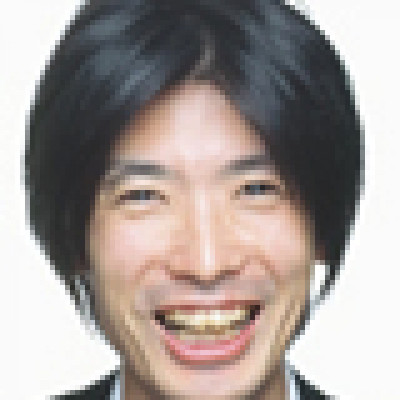
Warning: Undefined variable $current_post_id in /home/www/whowp02.cc.tsukuba.ac.jp/public_html/wp-content/themes/www.imis.tsukuba.ac.jp/archive-oz-custom-alumni.php on line 26
KAWAMOTO Hiroaki河本 浩明
Warning: Undefined variable $current_post_id in /home/www/whowp02.cc.tsukuba.ac.jp/public_html/wp-content/themes/www.imis.tsukuba.ac.jp/archive-oz-custom-alumni.php on line 27
筑波大学 システム情報系 准教授
When I was a university student, I spent a lot of time playing sports. My undergraduate thesis was about physical properties, but because I became highly interested in research targeting human movement, I decided to enter the Biomimetic Robotics Lab in the Department of Intelligent Interaction Technologies (IIT; predecessor organization of IMIS).
My research topic was wearable robotic suits which support/enhance human motor function. The research about technology development for human support, where I identified the characteristics of human motion and applied these to robotics, was a perfect theme for me. It was challenging, but fortunately because I was able to feel the demand in society for this technology from the beginning, I felt that my research was very rewarding and that I could do my best.
After receiving my PhD, I’m now working as an associate professor in the IIT department. I’ve been expanding the research I started when I was a graduate student as well as strongly promoting the research and development of technology for human support. Graduate school is a place where you can spend as much time as you like on your research work. Your “passion” is the key. Be passionate and put all your effort into your research. Your research will become more rewarding and attractive, and you will become more passionate about it. I look forward to seeing you having a fulfilling life in the IIT department.
[Now: Associate Professor, University of Tsukuba]学類時代は体育会でひたすら運動に打ち込んでいました。学類の卒研では物性に関する研究に励んでいましたが、人間の運動を対象とした研究にどんどん興味を持ち始め、大学院進学では思い切って、生体ロボットに関する研究室に進みました。
そこでの研究テーマは、人の運動機能を補助・強化するロボットスーツの研究、人支援技術として、人の運動特性を解き明かしながらロボットへ適用する研究はまさに私にぴったりのテーマでした。研究は何かと苦労が絶えませんでしたが、幸運なことに、研究当初から世の中の必要性を常に実感することがきたため、やり甲斐を持って取り組むことができました。
博士取得後、現在、本専攻の助教として働いており、学生時代の研究をさらに発展させ、人支援技術に関する研究開発を強力に推進しています。研究に思う存分打ち込めるのが大学院です。大切なのは、“情熱”。自分の研究にとことん向き合い、多いに情熱を注いでください。きっと、やり甲斐のある魅力的な研究になり、夢中で取り組むようになるでしょう。充実した大学院生活が送れるよう期待しています。
-

Warning: Undefined variable $current_post_id in /home/www/whowp02.cc.tsukuba.ac.jp/public_html/wp-content/themes/www.imis.tsukuba.ac.jp/archive-oz-custom-alumni.php on line 26
MAEDA Mika前田 実香
Warning: Undefined variable $current_post_id in /home/www/whowp02.cc.tsukuba.ac.jp/public_html/wp-content/themes/www.imis.tsukuba.ac.jp/archive-oz-custom-alumni.php on line 27
NTTアドバンステクノロジ株式会社 Webアプリケーション開発
In the Department of Intelligent Interaction Technologies (IIT; predecessor organization of IMIS), I was developing a computer based automatic “riddle” generation system.
Before I enrolled into the graduate school, I was a bit unsure about how I could do the research work with just the knowledge I had gained from my 4 years of university life. Research work was not that easy of course, but there was an ideal environment in the IIT department where I could make things happen with my interest and ability to take action.
I also had many opportunities to present my research during the program. Especially at academic conferences, even students with limited experience in a research field can make presentations at the same place as the world-renowned researchers and put forward their own opinions. This was a very precious experience for me.
When you engage in research work, you will need much support from teaching staff and senior students before getting to the stage of making a presentation. However, I also want you to remember that when you choose your own research topic, it is very important to think well about what kind of research you want to do and make the decision by yourself.
After graduation, some students, including me, gained employment in industries which weren’t directly associated with the research topic. However, the way of identifying problems, how to summarize your own ideas and how to explain these to others etc., were all skills which I learned through the research work and are something that can be useful in any kind of work.
[Now: NTT Advanced Technology Corporation (Web Application Development)]大学院時代は、コンピュータによる「なぞかけ」の自動生成について研究しました。
入学前は、大学で4年間学んだだけの自分に研究ができるのだろうかと不安な時期もありました。もちろん研究は簡単なことではありませんが、自分の興味と行動力があれば実現可能な環境が整っていたと思います。
また、大学院では研究発表の機会が多くありました。中でも学会では、研究歴の浅い学生であっても、世界で活躍されている方々と同じ場に立ち、一人の研究者として自分の考えを述べることができます。私にとって、これは非常に貴重な経験でした。
皆さんも、おそらく発表に至るまでには、先生や先輩方に様々な面で助けていただくことになるでしょう。しかし自分の研究として発表するには、テーマについて一人称で考えることが大切だと思います。
修了後は私のように、テーマとはあまり関連のない仕事に就く人もいます。しかし研究を通して学んだ問題の捉え方、考えのまとめ方、人への伝え方はどんな仕事でも生かせることだと思います。
-

Warning: Undefined variable $current_post_id in /home/www/whowp02.cc.tsukuba.ac.jp/public_html/wp-content/themes/www.imis.tsukuba.ac.jp/archive-oz-custom-alumni.php on line 26
EHARA Fumiaki江原 史朗
Warning: Undefined variable $current_post_id in /home/www/whowp02.cc.tsukuba.ac.jp/public_html/wp-content/themes/www.imis.tsukuba.ac.jp/archive-oz-custom-alumni.php on line 27
宇部工業高等専門学校 制御情報工学科
I enrolled into the Graduate School of the University of Tsukuba from another university (Kyushu University, Faculty of Mathematics). When I was a university student, I became interested in the study of musical instruments and decided to go to graduate school.
However, I found at that time that there were not many laboratories which studied about musical instruments (not even many now also). Actually if you consider only national universities, the only one was the Department of Intelligent Interaction Technologies at the University of Tsukuba.
Because I was not only from another university but also from a faculty of mathematics, I had to work harder on studying new subjects. However, with the aid of my colleagues in the lab and many others, I successfully completed my PhD.
Now I’m working as an associate professor at the National Institute of Technology, Ube College. Teaching classes is the main part of work at the collage, however, when students work on their graduation research in their fifth and final year, I also work on the research I conducted during my PhD as well as new research on acoustics with my students.
Being a graduate student is the greatest opportunity to “expand knowledge” in your life. When you start working, you will have much less time to be able to spend on learning for yourself. I hope you take advantage of the time you spend as a graduate student to live the life you choose.
[Now: Professor, National Institute of Technology, Ube College (Department of Control and Information Systems)]私は他大学(九州大学理学部数学科)から筑波大学の大学院へ進学しました。学部生の時に楽器に関する研究に興味を持ち、大学院へ進学することを希望しました。
しかしながら当時は楽器に関する研究を行っている研究室は少なく(現在も少ないですが…)、国立大学では筑波大くらいしかありませんでした。
他大学の、しかも理学部からの進学ということで、新しい科目の勉強など大変なこともありましたが、研究室の友人の助けなどもあり、最終的には博士号を取得することができました。
現在は宇部工業高等専門学校で助教授として働いています。高専は授業等の教育活動が業務の中心ではありますが、最終学年の5年生では研究室での卒業研究を行い、大学に優るとも劣らない研究を行っています。私も研究室の学生といっしょに、大学院時代の研究の続きや、音響に関する新たな研究を行っています。
大学院は人生の中で「知識の貯金」ができる最後の大きな機会です。就職してしまうと他の業務におわれ、自分の学習のために使える時間は大きく減ってしまいます。大学院での時間を自分の人生のために有効に活用して下さい。





















